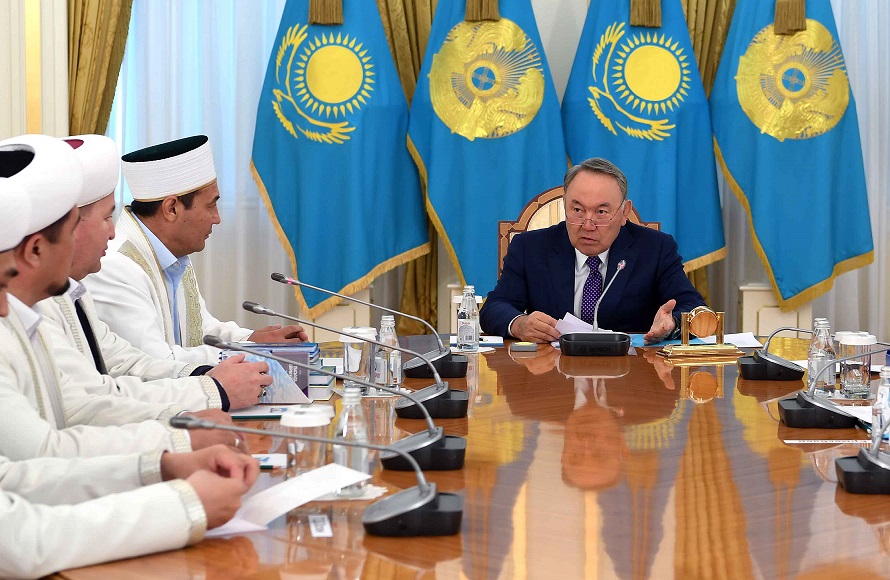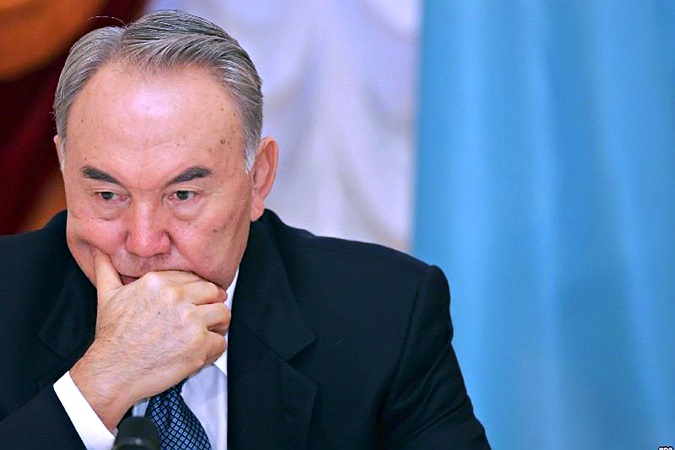Kazakhstan is mulling the passage of legislation that would ban Arab-styled black clothing for women, and growing beards for men.
During a meeting Wednesday in Astana with Kazakhstan’s Spiritual Board of Muslims, Nazarbayev attributed nefarious religious teachings to external groups and from “those who look with envy at a large territory and natural resources of the country”.
“One way to influence us from outside is introducing alien religious teachings for our people. This trend has been observed recently. We must fight against manifestations that are dangerous for our statehood,” Nazarbayev addressed the clerics.
With a population of about 18 million people Kazakhstan unites more than 100 ethnicities, including Kazakhs, who made up 63 percent of the population, as well as Russians, Uzbeks, Ukrainians, Germans, Tatars and Uyghurs. About 70 percent of the country’s population practices Sunni Islam, although 26 percent of the population is Russian Orthodox, with small minorities of Jews and Buddhists.
At the same time, there are about 15,000 adherents of the Salafism, an ultra-conservative movement within Sunni Islam that developed in Saudi Arabia in the first half of the 18th century.
After a series of deadly attacks in June 2016 in the northwestern city of Aktobe, the Kazakhstani government accused Salafists of the crime, prompting it to create the Ministry of Religious Issues and Civil Society in a bid to oppose spread of the movement.
Nazarbayev believes that alien religious movements can shake the security of the Central Asian country.
“Independent Kazakhstan should have a bright future, the nation must be united, and the country should be secular and develop further,” Nazarbayev told the gathering of senior administration officials and influential clerics.

“We will not tolerate those who oppose our goal. These are not only the interests of the government; they are the interests of the entire people of Kazakhstan, and its future,” Nazarbayev added.
He said that a younger generation is already falling prey to extremist teachings and dramatic forms of religious dress code, because of ignorance.
“As a result of ignorance, our young people grow beards and cut their pants. The number of Kazakh girls who completely cover themselves with black clothes is increasing. That does not correspond to our traditions and our people,” Nazarbayev said. “It is necessary to work out the issue of banning that at the legislative level. Kazakh people wear black clothes only during mourning time,” he continued.
Elnur Ismayil, Research Fellow at the Turkey-based Wise Men Center for Strategic Studies (BILGESAM) said that 2016 was a turning point for Kazakhstan.
“For a long period, the Kazakh government tried to deny the role of religious radicalism as a threat in the country. But especially the last years, after 2016 terrorist attacks in Kazakhstan religious terrorism became a threat in Kazakhstan and the government approved the level of such threat,” Ismayil told Caspian News.
In 2016 three terrorist attacks struck the northwestern city of Aktobe. On June 5, two attacks took place where guns were being sold, while a third attack was aimed at a military unit. Multiple shootouts between terrorists and police officers occurred over the next few days, while another front opened at a children's camp three days later. All together the shootings resulted in seven deaths and 37 more injured. Eighteen attackers were killed and nine were arrested.
Kazakhstan’s police described the perpetrators as “followers of radical, non-traditional religious movements,” a phrase usually referring to Islamic extremists in Kazakhstan. President Nazarbayev said the attackers were Salafists and probably included Islamic State militants that had returned to Kazakhstan from Syria. He claimed the attacks were ordered from abroad, in an attempt to destabilize the country.
Ismayil said Nazarbayev’s call for new legislation is to minimize outside influence by means of foreign religious teachings.
“That is the reason why Nazarbayev is calling to increase religious literacy of imams based on national Muslim traditions. This is the will and continuation of the state’s policy to prohibit radical religious groups like Wahhabism, Takfirism/ISIS or persons financed by the outside,” Ismayil said, adding that the government will have more control over its population and especially over groups who has linkage to the radical religious movements once the appropriate law is adopted.
Dozens of Kazakhstani nationals have joined the Islamic State of Iraq and the Levant, also known as IS, ISIS, ISIL, or Daesh. In January 2015, a child soldier who claimed to have come from Kazakhstan was seen executing two alleged Russian spies in a video released by IS. Jihadist promotional materials distributed in November 2016 have stressed that IS actively using fighters from Central Asia as so-called shahid, or “martyr,” bombers.







 Russian peacekeeping forces, deployed in the Karabakh (Garabagh) region of Azerbaijan since 2020, have commenced their withdrawal from the area.
Russian peacekeeping forces, deployed in the Karabakh (Garabagh) region of Azerbaijan since 2020, have commenced their withdrawal from the area.
 Iran's senior military leaders described the drone and missile attack on Israel on April 14 night as “successful".
Iran's senior military leaders described the drone and missile attack on Israel on April 14 night as “successful".
 Azerbaijan officially unveiled the logo for the upcoming 29th session of the Conference of the Parties to the United Nations Framework Convention o...
Azerbaijan officially unveiled the logo for the upcoming 29th session of the Conference of the Parties to the United Nations Framework Convention o...
 Iranian President Ebrahim Raisi warned Israel that it would face a "real and extensive" response if it makes any "mistake" following Tehran’s missi...
Iranian President Ebrahim Raisi warned Israel that it would face a "real and extensive" response if it makes any "mistake" following Tehran’s missi...



